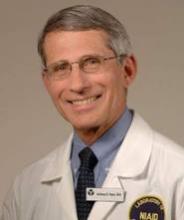A second potential Ebola vaccine has moved to human testing as part of a clinical trial at two Maryland facilities, according to the National Institutes of Health.
The study, conducted by the National Institute of Allergy and Infectious Diseases, is designed to test for safety and immune system response, enlisting 39 healthy adults aged 18-65 years, the NIH reported.
Participants will be split into three groups and given two intramuscular doses of the vaccine, or a prime-boost strategy, with each group receiving a different dose. Three patients in each group will receive a placebo, and a second dose will be delivered 28 days later. The testing is staggered so safety assessments can be made for the group receiving a lower dose before groups receiving a higher dose are given the vaccine.
The Walter Reed Army Institute of Research is conducting similar testing as part of the same trial, but will deliver the vaccine in single doses to “evaluate in real time the safety profile of the investigational vaccine when provided at different dosages and compare the immune responses induced by one injection versus two injections,” the NIH reported.
The vaccine, developed by Canada’s National Microbiology Laboratory and licensed to NewLink Genetics Corp., is called VSV-ZEBOV, and is based on a genetically engineered version of vesicular stomatitis virus, a disease which mostly affects other mammals, only rarely infecting humans.
In VSV-ZEBOV, “the gene for the outer protein of the vesicular stomatitis virus has been replaced with a segment of the gene for the outer protein of the Zaire Ebola virus species,” according to the NIH. People with the vaccine are completely incapable of contracting Ebola, the NIH added.
Initial data on the study should be available by the end of 2014. The testing for the vaccine has been vastly accelerated from normal clinical trials, from years to weeks, as the “need for a vaccine to protect against Ebola infection is urgent,” Dr. Anthony S. Fauci, director of the NIAID, said in the NIH press release.

